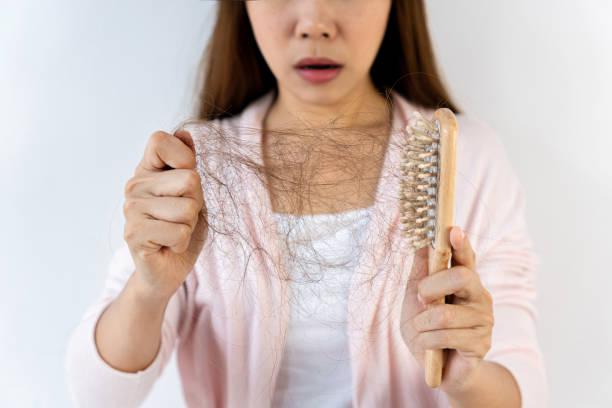Now Reading: Pregnancy and Hair Loss: Understanding the Connection
-
01
Pregnancy and Hair Loss: Understanding the Connection

Pregnancy and Hair Loss: Understanding the Connection
Pregnancy is a condition that triggers a lot of changes in the woman’s body, and one of the changes is the hair loss. Although most females love the full and thick hair that comes with pregnancy some women experience hair loss. Pregnancy, hair loss, its causes, the ways to prevent it and what a pregnant woman should expect afterward have been discussed in this article.
The Hair Growth Cycle
But to enable one understand hair loss during pregnancy, one has to understand the human hair growth cycle. This cycle has three phases: Anagen, catagen, and telogen. Usually, it is a three-month cycle but 80-90% of hair human hair is in this phase, which can last 2-6 years. The catagen phase is still another very brief period that may only last 2-3 weeks while the telogen phrase has a duration of about 3 months.
Estrogen levels in pregnancy causes changes in hair growth cycle, specifically increasing the anagen phase. This implies that a number of hairs are retained in the growth phase and as such many women now have fuller hair than they used to have.
Why Hair Loss Occurs During Pregnancy
- Hormonal Changes
As it was earlier established hormones have a vital role to play in hair growth. It is also important to note that during pregnancy there is usually an increase in the estrogen and progesterone levels. Some of these hormones as you will learn, influence hair growth cycle, and this may result in some form of hair loss.
- Increased Hair Growth:
Some women are actually able to grow thicker hair due to hormonal changes noticeable in pregnancy; this occurs since Estrogen which is produced in large quantities during pregnancy makes hair to stay longer in the anagen phase.
- Hair Loss:
However, some women are likely to experience hair loss due to a low level of estrogen come about through stopping the use of oral contraceptive pill, an abortion or low estrogen level during pregnancy and the likes.
Types of Hair Loss
Telogen Effluvium: And this is a normal situation, which means that more hair loss occurs during the phase called telogen. It can be caused by changes in estrogen levels, hyperinsulinemia state or certain drugs.
Changes in Hair Texture: Some women may notice changes in hair texture, such as hair becoming straighter or curlier, due to hormonal fluctuations.
Managing Hair Loss During Pregnancy
Coping Strategies
If you experience hair loss during pregnancy, here are some practical strategies to help manage it:
- Choose the Right Hairstyle
- Use Volumizing Products
- Maintain a Healthy Diet
- Self-Acceptance
Hair Care Tips
Gentle Hair Care: Adopt gentle hair care routines to minimize hair loss. Use hair care products suitable for pregnancy.
Avoid Chemical Treatments: Be cautious with chemical treatments like hair dye and straightening treatments. Follow safety guidelines and consult your doctor if unsure.
Postpartum Hair Loss
What to Expect
Postpartum hair loss, also known as telogen effluvium, is a common condition that occurs about three months after childbirth. Here’s what you need to know:
Causes: The drop in estrogen levels after childbirth causes many hairs to enter the resting phase, leading to excessive shedding a few months later.
Duration: This excessive shedding typically lasts less than six months, and your hair should regain its fullness by the time your child is about one year old.
Signs: You may notice more loose hair on your brush, pillow, or shower floor. This is a normal part of the hair growth cycle readjusting after pregnancy.
Managing Postpartum Hair Loss
- Use Volumizing Shampoos
- Try a New Hairstyle
- Healthy Diet
Seeking Professional Help
If you experience excessive hair loss during or after pregnancy, it’s essential to consult a healthcare provider or dermatologist. They can help rule out any underlying medical conditions that may be contributing to the hair loss.
When to Seek Help
Excessive Hair Loss: If you notice more hair falling out than usual, seek medical advice to ensure it’s not a sign of an underlying condition.
Persistent Hair Loss: If your hair does not regain its normal fullness after one year, you may want to see a dermatologist to rule out other causes of hair loss.
Final Words
Hair loss during and after pregnancy is a common experience for many women. Understanding the hormonal changes and the natural hair growth cycle can help you manage this temporary phase. By adopting practical coping strategies, maintaining a healthy diet, and seeking professional help when necessary, you can navigate hair loss with confidence.





















